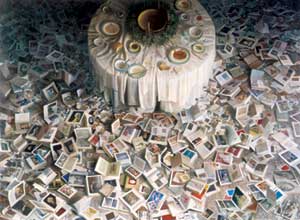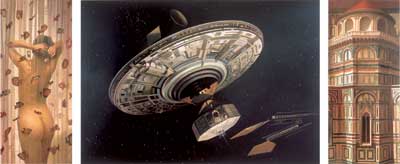Creating Imaginative Space for Ourselves

Photo from Occidental College Alumni Trip to Mammoth Site, Hot Springs, South Dakota

Photo from Occidental College Alumni Trip to Mammoth Site, Hot Springs, South Dakota
The course forum itself seems to be mimicking the process of evolution (=undirected change):
Paul: Forum seems to be bubbling along quite happily without explicit direction from me or Anne. That 's fine (more than). If you've got something on your mind, add it to the mix.
Bethany: I think that's all I have for now...still brewing.
Ro: Seems to me that this is germane...still thinking
And curiously (?)
multiple elements in this bubbling, brewing thought-experiment seem to be anticipating the [designed] arc of the course....
[In anticipation of] Daniel Dennett, Darwin's Dangerous Idea: Evolution and the Meanings of Life (p. 143):
"Are there units of cultural transmission analogous to the genes of biological evolution?
replicators in a different medium...subject to much the same principles of evolution as genes....
cultural item[s] w/ enough Design to be worth saving...?"
Many of you have already begun exploring this design space, in a number of different directions:
Several of you want to know how evolutionists explain the emergence of thought:
(where I'm going to pause, pick up a thread, make it visible)
Show @ the Marlborough Gallery in Manhattan

Backstory: Pieter Bruegel's "The Land of Cockaigne"

Vince Desiderio, "Cockaigne"
From "A 10-Year-Long Art History Course," The New York Times (Sunday, Febrary 1, 2004):
In Vincent Desiderio's ambitious new painting, "Cockaigne," six centuries of Western art lie scattered on the floor like the remains of a really great party....The title is a reference to Pieter Bruegel the Elder's "Land of Cockaigne" (1559), a moral allegory set in a land of plenty...the targets in Bruegel's painting were gluttony and sloth; Mr. Desiderio's version is a critique of what he calls "cultural bulimia"--our compulsive consumption of images that only leaves us hungry for more. It is also a comment on the predicament of painting in the 21st centry; faced with such a plethora of styles and formal idioms, how is it possible to create something new, something distinctive to our own time? "Cockaigne" is one artist's response to...the "anxiety of influence," an attempt, in Mr. Desiderio's words, "to reconfigure the history of art in order to create imaginative space for ourselves."

Vince Desiderio, "Pantocrator"
(From the press release for the show):
In the left panel a naked woman seen from the back is standing in a shower behind a clear curtain covered with fish. In the larger center panel a huge circular space station with the eye of its camera focused on the universe revolves in a starry night. In the right panel one sees a part of the Duomo Santa Maria del Fiore in Florence. The title of the painting comes from the Greek language and means "Ruler of All"....Desiderio...likes the triptych format because to him it seems closely attuned to today's fragmentation of life and thought. He also likes to set up a dialogue that produces meaningful correspondences between divided parts.
(From the catalogue for the show:)
The fantasy spaceship ...is a luminous construction in cosmic darkness--a triumph of technolgoical consciousness over the unconsciousness of space....Brunelleschi's building became the model for all subsequent perspectival architecture. Deseriderio's paintings are deeply involved in the perspectival construction of perception....Double focus is the subtext...The question of finding the proper place from which to contemplate a picture haunts Desiderio's pictures, as their juxtaposition of near and far views--their abrupt shifts in space and focus--shows. Which is the best place to stand to wake one from one's visual sleep to serious consciousness of what one is seeing?
turning back to "The Story of Evolution," Part III...